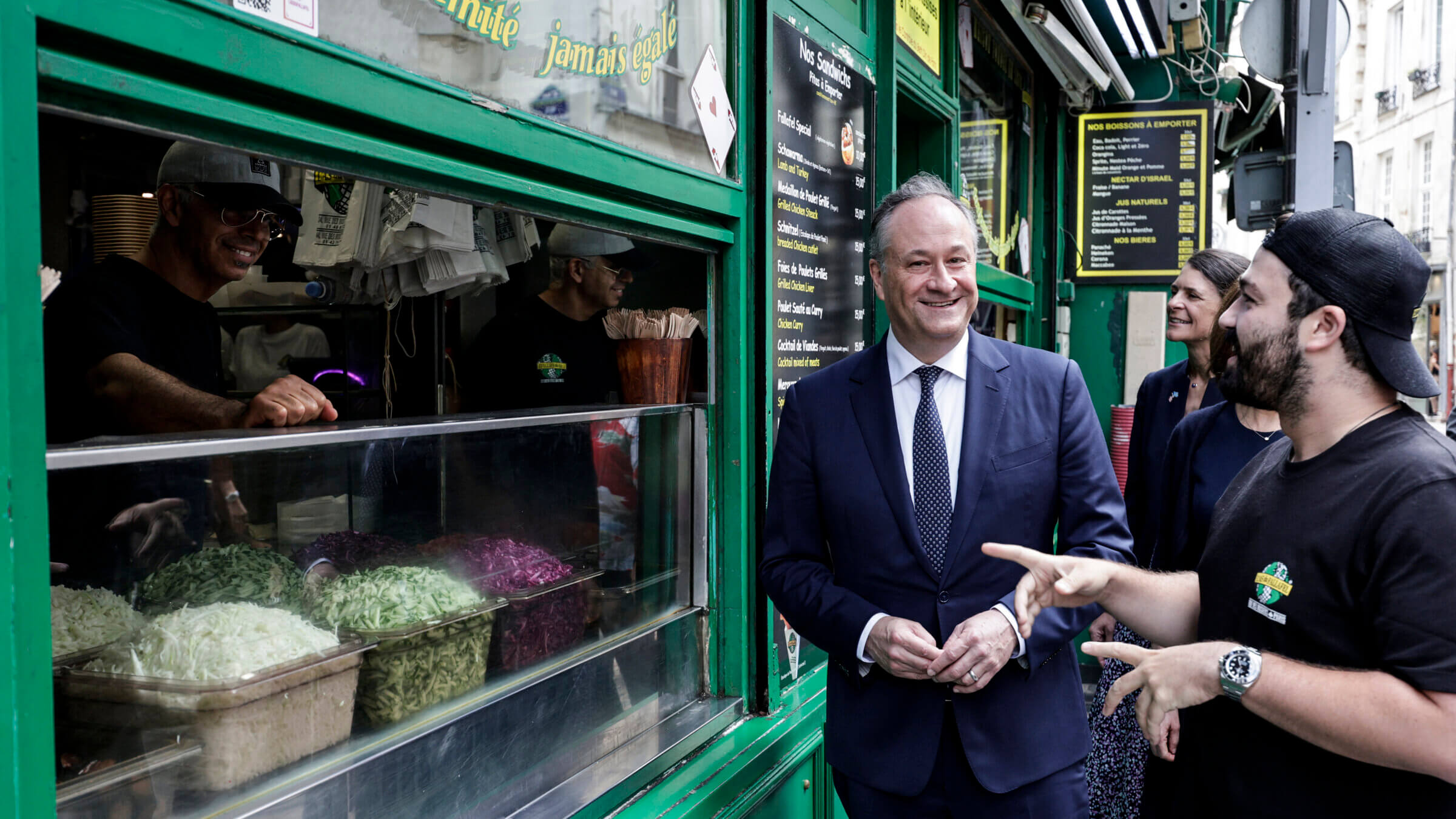How Doug Emhoff embodies a very specific form of Jewish joy
Speaking in Paris at the site of a deadly 1982 antisemitic attack, Emhoff displayed a defiant ‘glik’

US second gentleman Doug Emhoff speaks with the employee of a restaurant at the site of a deadly 1982 antisemitic attack. Photo by Getty Images
“I love being Jewish, and I love the joy that comes with being Jewish,” first Jewish second gentleman, and potential first Jewish first gentleman Doug Emhoff said recently in Paris, speaking with dem yidns glik, his pure Jewish joy.
Emhoff, known for officially sharing his Olympic level joy of being Jewish, has also become an outspoken national voice to counter antisemitism. With the current rise in antisemitism at home and worldwide, Jewish hostages still held captive for nearly one year, as well as a widening conflict in the Middle East, you might wonder: Why joy?
Emhoff was visiting a kosher deli that had been bombed in a deadly antisemitic hate crime in 1982 , when he shared his joy as if it were an incantation. Finding that his own glik contains wellsprings of a defiant resistance, perhaps Emhoff was aware of Jewish poet Hirsh Glik who wrote the Jewish partisan anthem during dire conditions of life under fascist Hitler.
Called “The Partisan’s Hymn,” its powerful opening lines tell us we are not on “our last path.” Emhoff’s joy in the face of the renewal of a formerly destroyed Jewish eatery is reminiscent of the hymn’s shattering concluding lines “mir zeynen do,” which means “we are here” — a testament to survival.
Interestingly, the Yiddish the word for disaster, umglik, borrows heavily from glik. In a 1903 society item titled tsu fil glik, in which a wealthy matron met an untimely death in a Jersey City hotel, the Forverts used both terms in one majestic concluding sentence warning readers that “too much joy,” tsu fil glik, led the woman to an umglik, “a disaster.”
That same Yiddish word for joy, glik, is also used to express luck, similar to mazl. Emhoff was a perfect example of both while affixing a traditional mezuzah containing sacred texts to the vice president’s residence. With their small nail holes, slanted placement and delicate surrounding artwork, mezuzahs are no friend to their installer and can be tricky to place. Perhaps due to Emhoff’s glik, the U.S. Surgeon General wasn’t needed.
If you aren’t feeling Emhoff’s current glik at being a member of the tribe, you’re not alone. In 1944, while the Holocaust still raged, Yiddish poet Kadya Molodowsky famously demanded an end to Jewish lamentations in her poem “el khanun.” “God of Mercy” she beseeched, “let another people be chosen.”
Clearly though, we’re living in a time of great glik. As for Doug Emhoff, whether you find him joyfully (and skillfully!), banging in a mezuzah on his doorpost or expressing his glik at a resurrected Jewish deli, clearly there’s bliss to be had in living an openly Jewish life.
A message from our Publisher & CEO Rachel Fishman Feddersen

I hope you appreciated this article. Before you go, I’d like to ask you to please support the Forward’s award-winning, nonprofit journalism so that we can be prepared for whatever news 2025 brings.
At a time when other newsrooms are closing or cutting back, the Forward has removed its paywall and invested additional resources to report on the ground from Israel and around the U.S. on the impact of the war, rising antisemitism and polarized discourse.
Readers like you make it all possible. Support our work by becoming a Forward Member and connect with our journalism and your community.
— Rachel Fishman Feddersen, Publisher and CEO






























